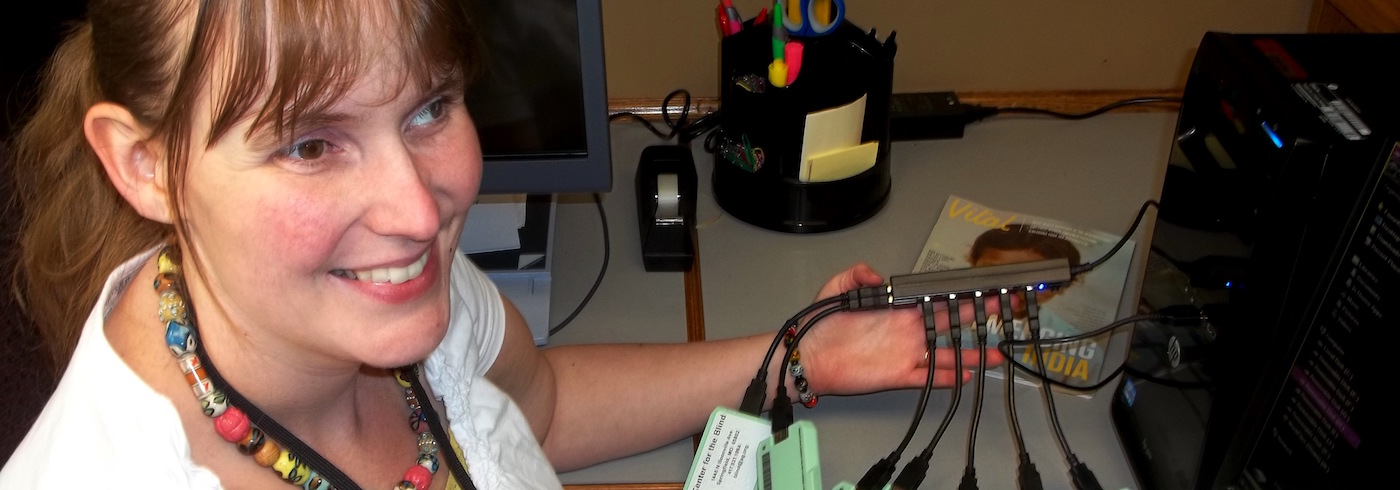Empowering the Blind
As director of the Assemblies of God Center for the Blind, Paul Weingartner has been equipping the visually impaired in America’s churches for 22 years
Nearly one in 43 Americans has a visual disability, according to data compiled by the National Federation for the Blind.
Since many of them don’t carry a cane or use a guide dog, most people don’t notice them, says Paul Weingartner, director of the Assemblies of God Center for the Blind in Springfield, Missouri. When people do notice, they often don’t know how to help.
“People don’t realize the numbers,” Weingartner says. “The need is there, but the blind are hard to reach because everyone is so different and they don’t stand out. They kind of get lost in the shuffle.”
For 22 years, Weingartner has led the national center in meeting the needs of those with visual impairments through a variety of braille and audio resources, including books and quarterly curriculum for children and adults. The center also offers a lending library, distributes free New Living Translation audio Bibles and counsels pastors and families on how to help the blind become active in their churches.
“There’s nobody doing anything like what the Assemblies of God is doing,” Weingartner says. “There are other denominations doing maybe a little bit here and there, but nothing as comprehensive as we are.”
Weingartner was born with a retinal issue that made him color blind and legally blind, meaning he has less than 10 percent normal vision. Many of Weingartner’s school teachers didn’t know how to help him adjust as he was growing up.
But when he was 8 years old, Weingartner sensed the Lord impressing a verse on his heart that would help direct his future: “You did not choose me, but I chose you and appointed you so that you might go and bear fruit — fruit that will last — and so that whatever you ask in my name the Father will give you” (John 15:16, NIV).
“I knew that my life belonged to Him and that He had ownership,” Weingartner says. “I felt a strong call to ministry.”
Following his high school graduation, Weingartner received a full-ride scholarship to LeTourneau University in Texas, where he majored in Bible and missions. After working with disabled youth in the Northeast and serving as a lay minister in California, Weingartner and his wife, Caryl, moved to Springfield to oversee the newly restructured Center for the Blind as U.S. missionary associates.
What they initially thought would be a short-term assignment became a ministry passion. Over the past two decades, Weingartner says, the Center for the Blind has expanded its library to 10 to 15 times its former size. The center has transitioned many resources to new technology, transferring cassette tapes to digital cartridges and formatting books for refreshable braille displays.
As an AG U.S. Missions ministry, the center relies on the support of individuals, churches, and organizations like BGMC, Speed the Light and Light for the Lost. The center also utilizes about a dozen volunteers each week, including Caryl, who serves as a missionary associate.
Aside from Paul, the only staff person at the center is his daughter-in-law Sarah, who began as a volunteer while attending Central Bible College in 2001 and came on board in 2006 as a certified braille transcriber. Sarah married Paul’s eldest son, Joe, earlier this year.
Also legally blind, Sarah says the center helps show that the blind don’t just need the gospel; they can also actively share and teach it in their churches.
“People tend to underestimate blind people and their potential for the kingdom of God,” Sarah says. “I think Paul really helps to break down some of those stereotypes and educate individuals that blind people can be an extremely valuable part of the body of Christ, and that they are worth investing in — not just because they need to know the gospel, but because they can be participants in sharing the gospel.”
The Center for the Blind currently has about 1,100 people registered to use its services. Nearly half, Weingartner says, are within the Assemblies of God. He says a main need the center has is getting the word out to visually impaired people who haven’t heard about its resources.
“One of the best things people can do is tell someone who’s blind about us because if they don’t, nobody else will,” Weingartner says.
Editor's Note: Do you know someone who is visually impaired? Connect them to the free resources and lending library at the Center for the Blind. Find a searchable list of offerings, and fill out a registration form at blind.ag.org.
This article was originally printed in Vital Magazine and has been used with permission.
Influence Magazine & The Healthy Church Network
© 2025 Assemblies of God

